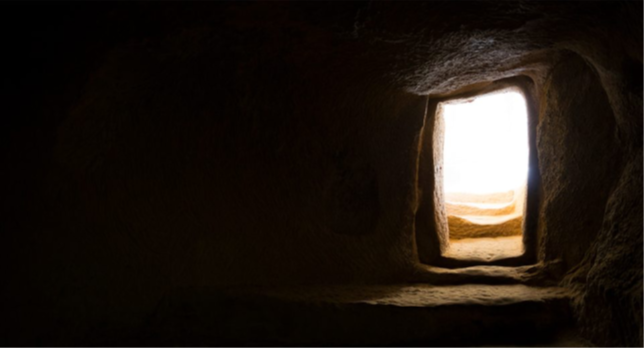From the Pastor’s Desk… May 2025
What Happens Next?
The resurrection hope of Easter
By Mindy Makant April 20, 2025
From Living Lutheran: https://www.livinglutheran.org/2025/04/what-happens-next/
My favorite story about the first Easter is found in Luke 
24. Two of Jesus’ followers have heard about—quite
possibly even witnessed—the cruel suffering and death of
Jesus and are walking away from Jerusalem, brokenhearted. They are joined on their way by a stranger who seems not to know why they might be so disheartened. “We had hoped,” they tell their companion, “that [Jesus] was the one to redeem Israel” (21)
“We had hoped.” These words carry so much weight, so much sadness. In fact, they strike me as three of the saddest words in Scripture. “We had hoped” implies that their hope had been misplaced.
But their story continues, despite their hopelessness, with the three travelers stopping for
the night. When they do, their strange companion becomes host over a meal, breaks bread
and gives it to them. The two disciples realize that Jesus—both the object and the source
of their hope—has been with them all along.
Their hope was not misplaced. Jesus is risen from the dead.
It is hard to imagine the tidal wave of emotions these two must have felt. But their story
gives me hope.
The hope of Scripture—is not a petty want but a deep longing for the
promised fullness of God’s presence..
Hope, like love, is a word that can be stripped of its meaning through casual use. I may
hope my coffee shop has my favorite scones this morning, or I may hope the weather will
clear up and be sunny instead of rainy this afternoon. However, hope as a theological
virtue—the hope of Scripture—is not a petty want but a deep longing for the promised
fullness of God’s presence; it is the expectation that, as medieval anchoress Julian of
Norwich wrote in her book Revelations of Divine Love (1670): “All shall be well, and all
shall be well, and all manner of thing shall be well.”
Indeed, as theologian and pastor Frederick Buechner wrote in The Final Beast (1965):
“The worst isn’t the last thing about the world. It’s the next to the last thing. The last thing
is the best.” Or, as Martin Luther might have put it, Easter means that sin, death and the
devil do not win
Despite all experiential evidence to the contrary—pandemics, war, political division,
family turmoil—despite all our own real and painful “we had hoped” moments, the
resurrection of Jesus promises that the very thing we fear most is, ultimately, not to be
feared, because the love of God cannot be stopped by the power of death.
In every funeral sermon he gives, my favorite pastor (my husband) proclaims, “Death does
not get the last word; life does—God does.”
God’s promise
A quick stroll through just about any store today could lead one to think that Easter has
something to do with stuffed bunnies, pastel-colored trinkets and an abundance of cheap
chocolate. But Jesus did not suffer, die and rise again so that we could have cream-filled
eggs, chocolate crosses or a peripatetic bunny.
The mental gymnastics required to take us from a resurrected Jesus to lavender fidget
poppers defies logic. I don’t find our commercialized Easter to be a compelling story. It
does not speak to my “I had hoped” moments; it is not a story on which I can stake my
life.
Easter is a story of Jesus, God-made-flesh, the newborn Emmanuel we celebrated a few
short months ago, who chose to live his life loving people pushed to the margins, who ate
with those society declared sinners, who healed the sick, played with children and
befriended those his social world called “other.”
Easter is a story of Jesus, God-made-flesh, who loved so radically, so openly, that the
powers that be could not tolerate the ways Jesus’ life threatened the status quo.
Easter is a story of Jesus, God-made-flesh, crucified—executed—by the power of the state.
Easter is a story of Jesus, God-made-flesh, refusing to stay dead. And Easter is a story of
Jesus, God-made-flesh, who promises to come again to wipe every tear from every eye and
to usher in a world in which death and dying will be no more.
That is a compelling story to me. One on which I can stake my life..
Easter is the story that helps us hold on to the hope that the end of the world is not, in fact,
the end; that all our “we had hoped” moments will ultimately be redeemed. Hope is our
placeholder; it is the pause between the tick and the tock of the pendulum of time. Hope is
the thing that holds on to us in this time between the (experienced past) resurrection and
the (promised future) return of Jesus—in Greek, the parousia (second coming).
The resurrection hope of Jesus doesn’t diminish the pain and suffering of living in a Good
Friday world, a world in which the effects of sin, death and the devil persist. Resurrection
hope makes it more poignant, more painful, precisely because through the empty cross of
Jesus we see more fully the promised fullness of the kingdom of God
The resurrection of Jesus is God’s promise that our hope is not in vain.
The end and the beginning
This promise does not, of course, make everything easy. As a professor, I spend much of
my time with young adults. I’m not a social scientist, but my anecdotal observations are
borne out by social science research. Our youth and young adults are more anxious, more
fearful of the future, more depressed and, in short, less hopeful than the generations before
them.
The reasons for this are legion and beyond the scope of my expertise. But I find, again and
again, that offering a space for students to express their feelings of hopelessness in the
context of a safe theological space allows them to discover the hope that Jesus’ resurrection
means for them too.
One of my dearest mentors taught me that, when someone is wrestling with difficult
decisions, we should ask, “What is the worst thing that could happen?” After all the worstcase
scenarios are talked through, he suggests that we ask, “What happens next?” I love
this question. After the worst thing you can imagine happening, even after death, then
what?
Easter is our “what happens next” promise. This promise allows us to live
in faith, hope and love.
In this question there is often great freedom: you discover that the worst thing you imagine
will not be the end of your story, that there is, in fact, a next.
Easter is our “what happens next” promise. This promise allows us to live in faith, hope
and love—despite all apparent evidence suggesting that to do so is foolish—trusting that it
will not be in vain, because the worst things the world has to offer are not the end of the
story.
The very God who raised Jesus from the dead promises to resurrect our worst-case-scenario
of death too. This is the hope in which we live and move and have our being. Easter is the
promise that God’s love is, in fact, the beginning and the end of our story..
God’s Blessings and Peace
Pastor Neil
Pastor’s Office Schedule
As of today, my schedule “in-office” will be: Wednesdays from 9am to 4pm. Of course,
I will be attending team meetings, and I am available throughout the week. Please call me
or text me at 419-303-7718. Thanks




